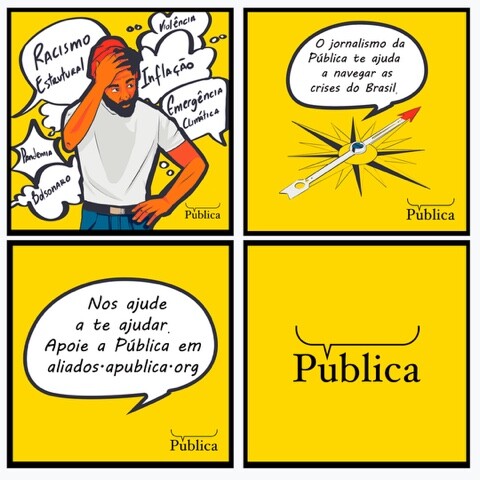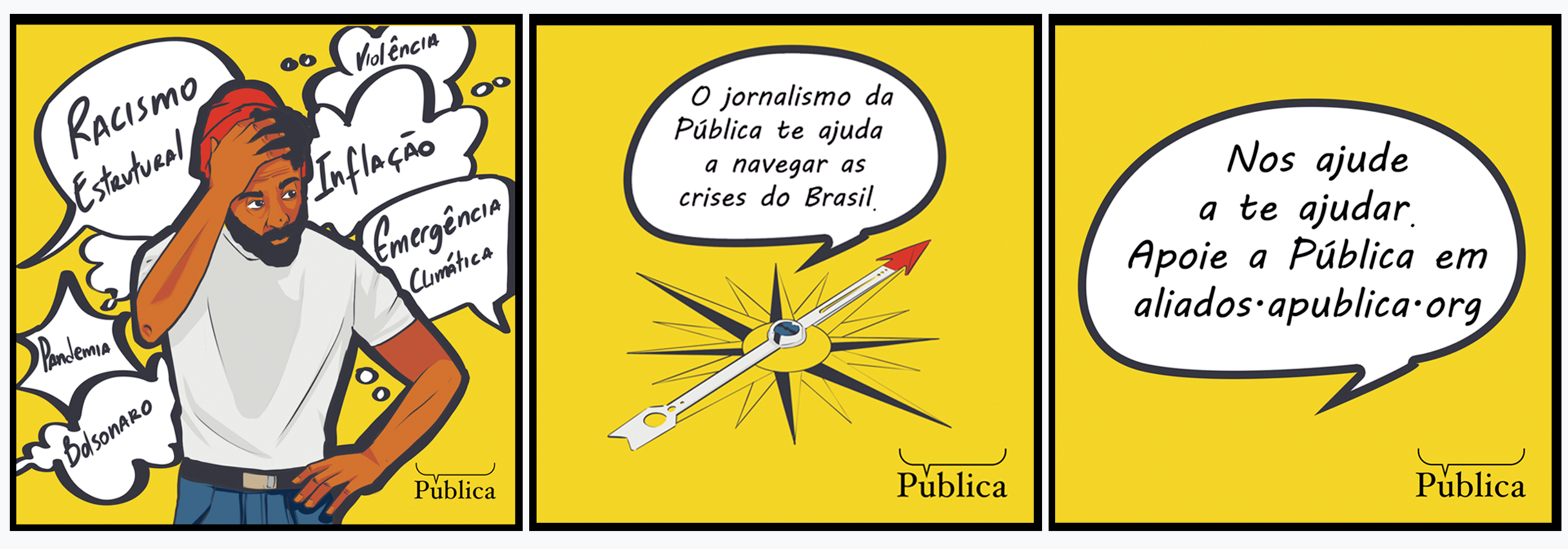The clip promoting Brazil’s 2014 World Cup shows a conference table in a New York office. The cry of “goal!!” echoes from a far away place, and an American in a tie asks, “Did you hear that?”
The video continues showing Brazil’s natural wonders, including Rio de Janeiro’s beautiful beaches and Iguazu’s cataracts. The voiceover concludes: “Brazil is calling you. Celebrate life here.”
In Brazil, however, the voices coming from the streets appear to be more in protest than in celebration. Obsessed with soccer, the fans say that they are threatened by cabinet agreements and that their rights are being robbed by FIFA’s demands and the pharaonic public work projects that are tearing up their cities.
This is what the report titled “Mega-eventos e violações de Direitos Humanos no Brasil” (Mega-Events and Human Rights Violations in Brazil) concludes. Prepared by a coalition of popular committees for the World Cup and the Olympics, the report was released on Monday by Publica and popular committees throughout the country.
On Monday, several demonstrations took place in Brazilian cities slated to host the World Cup matches — from Rio de Janeiro to Recife, in the Northeast. Organizations handed out the report to mayors of different cities, as well as to the federal government in the capital, Brasilia.
Monitoring Public Works
The document was released shortly after the committee launched its own site to monitor the situation of the fans in the countdown to the start of the World Cup.
The site and the report were produced in conjunction by popular committees, which are associations of social organizations and people that will be affected by the works in Belo Horizonte, Brasilia, Cuiaba, Curitaba, Fortaleza, Manaus, Natal, Porto Alegre, Recife, Rio de Janerio, Salvador, and Sao Paulo.
In addition to denouncing rights violations, the report provides an overview of the planned works ahead of the World Cup, including estimated costs, bidding prices, and progress reports.
Remodeling the Maracanã stadium, for example, had an estimated cost of 600 million reais (roughly $320 million US dollars), but was auctioned at a cost of 859 million, half paid by the Brazilian Development Bank. Similarly, work on Rio de Janeiro’s port piers, which had an estimated cost of 314 million reais (about $170 million US dollars), were auctioned off for 610 million reais (about $325 US dollars). The same thing happened with dozens of projects.
Thousands Affected — And That’s Just The Beginning
The popular movements, supported by academics and researchers, estimate that at least 170,000 people have had their housing rights violated or have been threatened by the mega-events to come, particularly the 2014 World Cup and the 2016 Olympics.
The report points out that the 2014 World Cup taking place in 12 cities and the 2016 Olympics in Rio de Janeiro add critical new elements to the already serious housing problems in these parts: Huge urban projects with economic, agrarian, environmental, and social impacts. For example, poor neighborhoods may not “fit” around expanding luxury condominiums and commercial centers, which may trample communities.
While there is no official data on the number of evictions, the report makes an estimate based on accounts from those who live in the cities.
By early December, there were 21 cases of villages and favelas in the cities of Belo Horizonte, Curitaba, Fortaleza, Porto Alegre, Recife, Rio de Janeiro, and Sao Paulo that had been cleared out “with war strategies,” according to accounts from their residents.
“[They are] strategies of war and persecution, such as painting houses without permission, entering homes without judicial authority, misappropriating and destroying personal property, using verbal violence against residents, threatening integrity and family rights, cutting public services, and demolishing and abandoning the ruins of one in every three houses so that neighboring homes overlook scenes of terror,” the report notes.
One of the most emblematic cases is the Linear Várzeas do Tietê park in Sao Paulo:
Divided in three stages, the work includes the construction of an avenue, ‘Parque Via,’ to ‘increase the value of the area’ […] that lies on the edges of the Ayrton Senna highway between the Guarulhos International Airport and the site of the future Corinthians stadium, Sao Paulo’s likely site of the World Cup games in Itaquera.More than 4,000 families have already been removed from the site without being consulted about the park, and without knowing where they will go. Another 6,000 families are waiting, ignoring their fate. “They caught us by surprise. With such a large project, the community should have at least been consulted […] The families had been living there for more than 40 years before it became an Environmental Protection Area,” says community leader Oswaldo Ribeiro.
One of the most threatened cities is Fortaleza, which, according to the document, will have more than 15,000 families affected by World Cup projects.
Worker Exploitation Sparks 10 Strikes Across The Country
FIFA decided that stadium construction should be completed by December 31, 2012, in time to host the 2013 Confederations Cup.
Several times, the organization’s secretary general Jérôme Valcke made statements in which he noted increasing delays in the works and higher costs to the state. Faced with such pressure, someone had to pay the bill.
According to the report, it ended up being the workers on the projects: “This pressure also appears to favor the contractors themselves, once they contribute to the legal abuses, extra public fund contributions, irregularities in the licensing process for permits, and incompleteness of some projects without any regard for economic, environmental, or judicial security,” the report confirms.
“Moreover, it served as a pretext for workers’ rights violations in the construction of stadiums and works on infrastructure. The combination of the size of the projects and the tight schedule on which they’re supposed to be completed has already resulted in poor working conditions and exploitation of workers, despite the million-dollar figures for the works.”
Quickly, demonstrations, blockades, and strikes began popping up across the country.
The report, which covers incidents up through November 2011, shows that there were at least 10 strikes in 6 of the 12 stadiums to be used for the World Cup: the Mineirao in Belo Horizonte, the Mane Garrincha in Brasilia, the Arena Verdao in Cuiaba, the Arena Castelao in Fortaleza, the Arena Pernambuco in Recife, and the Maracana in Rio de Janeiro.
The main demands of the strikes ranged from wage increases and benefits like health insurance, food assistance and transportation, to improved working conditions (in particular, the protesters had complaints regarding the security situation, sanitation, and food), increased overtime payment and the end of “inhumanely long” working hours.
The People — Left Out Of The Party
While these social movements are increasingly promoting debate around the World Cup preparations, the general population does not participate in the structure or planning. The organization’s doors are closed to public participation, according to the report.
“Information about the preparations for the 2014 World Cup and 2016 Olympic Games is not only denied to the general population, but kept secret from even government organizations themselves, including public prosecutors,” says the report, continuing: “In this context, we see the affected populations outside of the decision-making institutions, and without access to basic information about their rights. Meanwhile, a range of organizations are instated at the federal, state and local levels, such as managers, committees, legislative groups and special secretariats of the Cup.
After The Cup, The Legacy Remains
In a letter attached to the report, the popular committees appeared concerned with the legacy that will be left by the two mega-events.
They say that up until now, it’s not evident that the works minimally contribute to social inclusion and progress in social, economic, cultural, and environmental rights: “On the contrary, the lack of dialogue and transparency of the investments points to the repetition of what occurred leading up to the Pan American Games in 2007, when we saw a waste of public resources (according to the The Brazilian Court of Audit [TCU], more than 3.4 billion reais, or about 2 billion dollars, were improperly spent, but no one was punished) in projects that have become overpriced white elephants.”
Story published by The Huffington Post. Click here to see the original.










